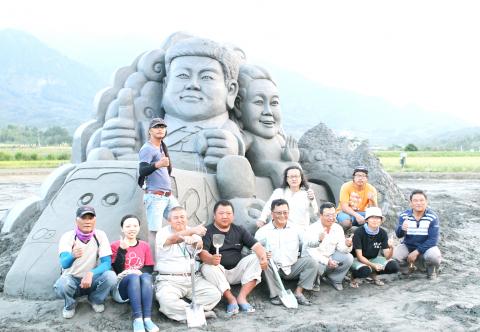With only six days remaining before the Nov. 29 nine-in-one elections, some Hualien County residents said they were “disgusted” when they found a sand sculpture of Hualien County Commissioner Fu Kun-chi (傅崑萁) and his wife placed conspicuously at the venue of a local flower festival scheduled for next month, calling it an act of “brown-nosing.”
Fu, an independent seeking re-election, is currently appealing to the Supreme Court in the hopes that the judges will overturn a ruling the High Court passed down in August last year that sentenced him to three years in prison for speculative stock trading.
His wife, Hsu Chen-wei (徐榛蔚), has also registered as a Hualien commissioner candidate, which has been widely seen as a contingency plan in case her husband is indicted prior to the election.

Photo: CNA
Earlier this month, the Fuli Township Farmer’s Association commissioned sand carving artist Yeh Kun-ting (葉坤定) to create the piece, which was nearing completion yesterday.
The artwork, made of soil dug from the fields, features caricatures of Fu and his wife sitting on top of the Taiwan Railways Administration’s Taroko Express, with Fu giving the thumbs-up gesture, prompting speculation that the piece was created to further Fu’s political aims, given the elections next week.
The sculpture, meant to promote the flower festival slated for next month, drew some criticism from passers-by.
“Isn’t that the commissioner and his wife? That’s disgusting,” one said.
“Whoever did this must be really desperate to brown-nose,” another said.
In response, Fuli Township Farmer’s Association Promotion division head Lin Hui-huang (林輝煌) said that Fu has taken the Taroko Express north many times to help market the county’s agriculture and horticulture, touting him as “local farmers’ best friend.”
The sand sculpture of Fu giving the thumbs-up sign is meant to show Fu’s solidarity with local farmers, not meant to suck up to him, he said.

Taiwan is stepping up plans to create self-sufficient supply chains for combat drones and increase foreign orders from the US to counter China’s numerical superiority, a defense official said on Saturday. Commenting on condition of anonymity, the official said the nation’s armed forces are in agreement with US Admiral Samuel Paparo’s assessment that Taiwan’s military must be prepared to turn the nation’s waters into a “hellscape” for the Chinese People’s Liberation Army (PLA). Paparo, the commander of the US Indo-Pacific Command, reiterated the concept during a Congressional hearing in Washington on Wednesday. He first coined the term in a security conference last

Prosecutors today declined to say who was questioned regarding alleged forgery on petitions to recall Democratic Progressive Party (DPP) legislators, after Chinese-language media earlier reported that members of the Chinese Nationalist Party (KMT) Youth League were brought in for questioning. The Ministry of Justice Investigation Bureau confirmed that two people had been questioned, but did not disclose any further information about the ongoing investigation. KMT Youth League members Lee Hsiao-liang (李孝亮) and Liu Szu-yin (劉思吟) — who are leading the effort to recall DPP caucus chief executive Rosalia Wu (吳思瑤) and Legislator Wu Pei-yi (吳沛憶) — both posted on Facebook saying: “I

Sung Chien-liang (宋建樑), who led efforts to recall Democratic Progressive Party (DPP) Legislator Lee Kun-cheng (李坤城), was released on bail of NT$80,000 today amid outcry over his decision to wear a Nazi armband to questioning the night before. Sung arrived at the New Taipei District Prosecutors’ Office for questioning in a recall petition forgery case last night wearing a red armband bearing a swastika, carrying a copy of Adolf Hitler’s Mein Kampf and giving a Nazi salute. Sung left the building at 1:15am without the armband and covering the book with his coat. Lee said today that this is a serious

The Ministry of Economic Affairs has fined Taobao NT$1.2 million (US$36,912) for advertisements that exceed its approved business scope, requiring the Chinese e-commerce platform to make corrections in the first half of this year or its license may be revoked. Lawmakers have called for stricter enforcement of Chinese e-commerce platforms and measures to prevent China from laundering its goods through Taiwan in response to US President Donald Trump’s heavy tariffs on China. The Legislative Yuan’s Finance Committee met today to discuss policies to prevent China from dumping goods in Taiwan, inviting government agencies to report. Democratic Progressive Party Legislator Kuo Kuo-wen (郭國文) said